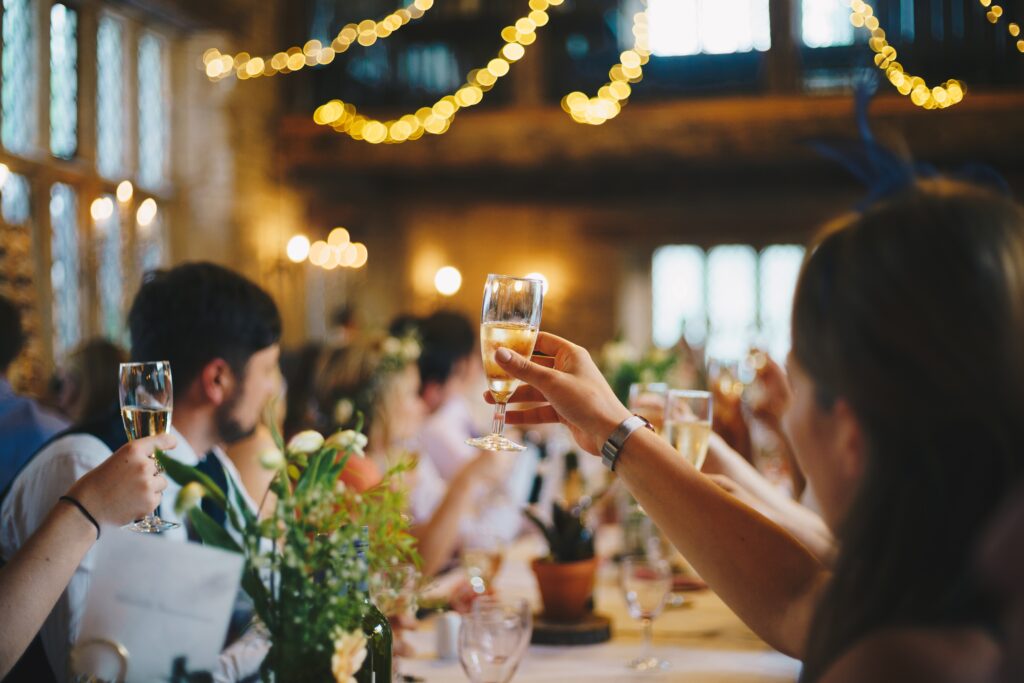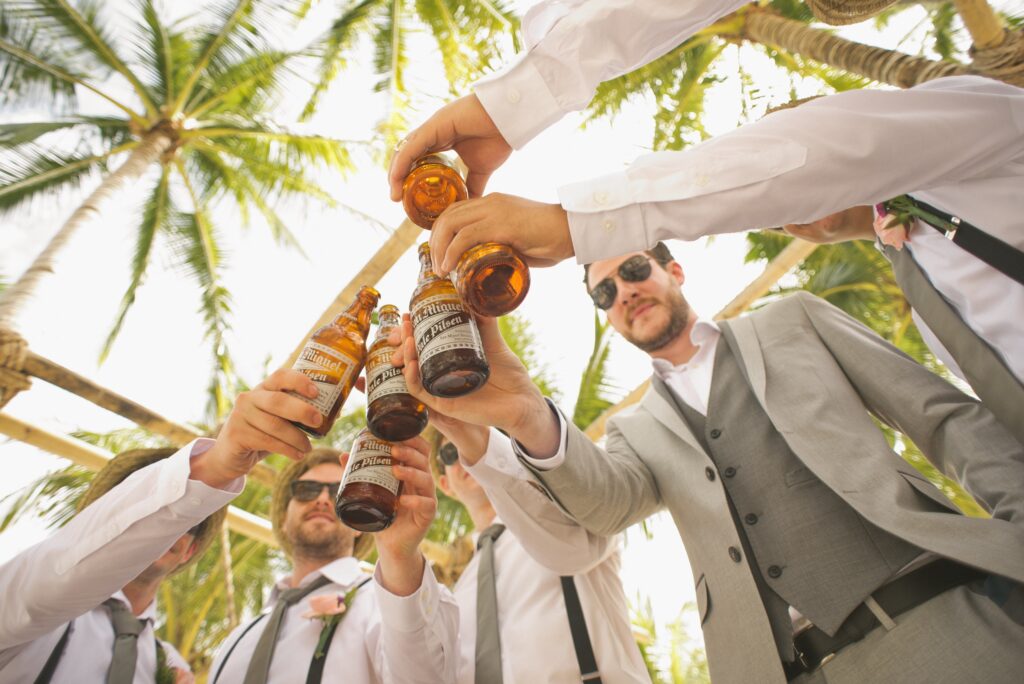If you’ve spent any amount of time on TikTok or Instagram, you know that wedding speeches go viral so fast, whether it’s because they were really good or…not so good. And we don’t want that!
Today’s topic is something that comes up a lot; not only for the couple but for the best man, maid of honor, parents, or anyone who will be giving a toast at the wedding.
We want to make sure that all of our couples have the resources available to write wedding speeches and vows that they love, so today, we have our friend Brian here to talk about it!
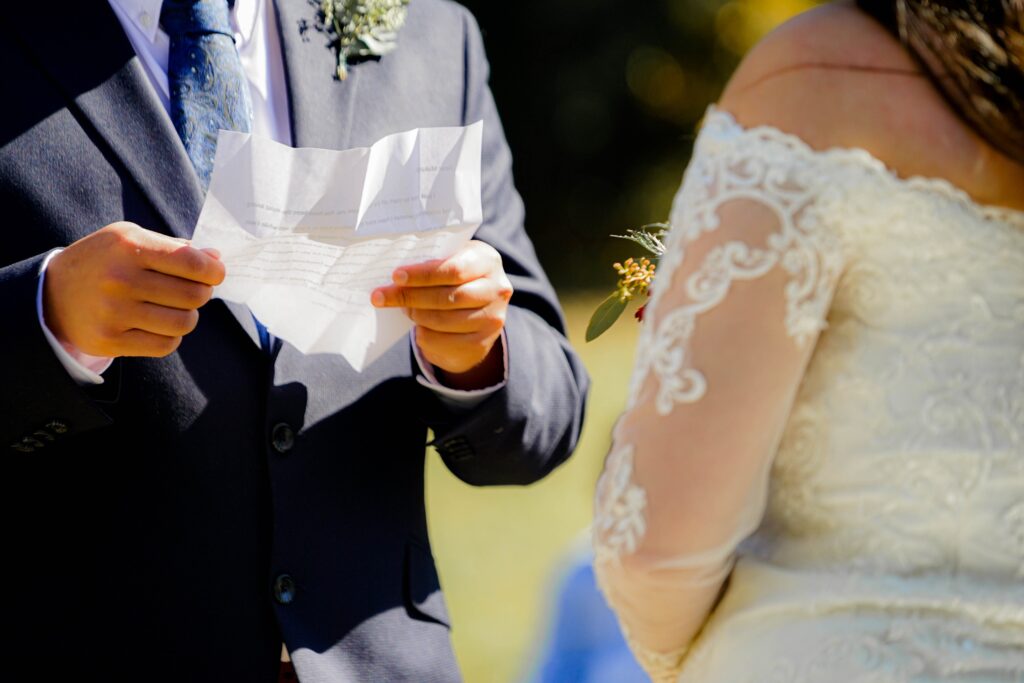
Welcome Brian! Can you introduce yourself and tell us a little about what you do?
Brian: I am Brian Franklin. I’m the co-founder of Vows and Speeches. We primarily work on wedding speeches, custom vows, and ceremony scripts for internet-ordained officials who don’t have much experience doing that.
These moments are one of the hardest forms of public speaking because they are so full of emotion. They are filled with high expectations, and often alcohol’s involved.
Not everyone is expected to be a great writer or speaker; it just doesn’t come naturally to everyone; so we are there to just offer some assistance through both the writing and the delivery.
The Wedding Duo: I can’t tell you how often people are winging it, so during dinner, I go around, and I talk to the best man, maid of honor, father of the bride, father of the groom, the usual suspects. I find them and give them some quick mic etiquette, like, please stand on that side of the table because we’re taking pictures and video. I want you to orient your body this way. Don’t stand here. Look that way because people are taking pictures. Stand next to the couple. Face yourself this way. And then I say, do you have notes, or are you winging it? And so many people, like the best man, say, “I’m just gonna wing it.”
Brian: These are avoidable problems that exist at almost every wedding. It’s very rare that all wedding speakers are well prepared and know the timing for their speech, or even know what things to say and what not to say!
So I think it’s really incumbent upon couples to think about, who’s speaking in my, in my wedding party? And are any of them going to have trouble with it? Are they going to be afraid of public speaking or, or are you afraid of what they’re going to say or what they might do?
Can you tell us a little about the process of working with you?
Brian: The first step of the process is the interview, and I think that’s really the most important part of it. We’re seeing a lot of talk about AI and how AI’s going to transform writing, but you wouldn’t really want to talk to AI as your therapist per se. And some of the interviews involve a little bit of psychotherapy because we’re teasing out feelings, and we’re getting people that aren’t always comfortable talking about their emotions or about their love to give answers and tell stories and that sort of thing.
It is a very fun endeavor. I think for most people, we have a good time with it, and I’ll ask questions that range from the obvious, like, “How did you meet” and “What did you think when you first saw them” and you know, “Was this love at first sight” and that kind of stuff.
But we’ll also talk about the things that go wrong, like what are some of the pet peeves that you might have about each other, that you tease each other about. What are some of the things that make this person different from other people? And do they have any weird quirks, like do they not eat mushrooms or something like that?
And then what we wind up doing is taking this 30-45 minute interview and condensing it down to 1- minute of vows or a 3-4 minute speech.
Once we have a draft, we give it to the couple and give them unlimited revisions.
When we have a draft they are happy with; we encourage them to practice it out loud and often. I find that once people practice it out loud enough times, they find a rhythm, and it stops sounding like something they are reading.
Finally, we book a practice session. During this session, we give them extra tips to add dynamics to their speech. Things like “make sure to smile” and “pause after this part to allow for laughter.” Adding dynamics in and practicing it with them helps them to go into it with more confidence and excitement or to desensitize them a bit if they tend to cry really easily.
The Wedding Duo: I feel like the practice session would really help with timing too. Something we’ve experienced as vendors is that people get really nervous standing up there and just don’t realize how long they’ve been talking.
Brian: Absolutely. It’s hard to watch the clock while you’re talking, and if you’re just using bullet points and winging the rest, you’re going to speak too long; it’s just natural.
The Wedding Duo: Another problem we see with people winging it is that they will start to tell stories that would be better told at, say, the bachelor party, and not during their wedding.
Brian: Yes. This is not your chance for big-shot stand-up comedy. You are not there to knock everybody’s socks off with your humor; you are there to give a tribute to the couple. You can be funny doing that, and hopefully, you will be, but if you try too hard, it will probably go badly.
How much of the reception should the couple dedicate to speeches?
Brian: Ideally, speeches should run about 15 minutes in terms of total speeches; however, you want to break that up. Usually, we plan for 3-4 minutes per speech.
If you have more people that want to speak, perhaps if you have a large blended family, one idea is to have them deliver their speech at the rehearsal dinner the night before. Or if they are really shy, they can even deliver it to the couple in private.
This is also why it’s important for the people delivering speeches to practice reading it out loud beforehand because it’s hard to gauge what 3 minutes of speaking looks like on a page. With normal margins and 12-point font, it’s usually a page or page and a half at most, but people speak at different speeds, so it’s just good to have them practice and stay within your guidelines to be sure. For more wedding day timeline tips, check out this post.
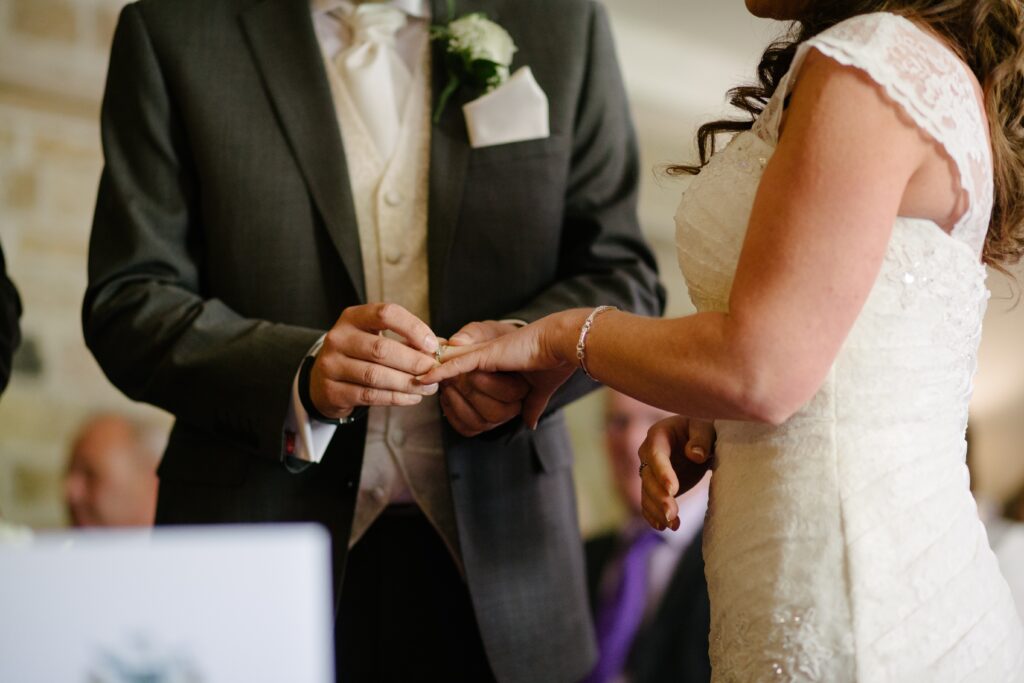
You interview the couple, but do you also talk to the other people involved, such as the best man, maid of honor, or officiant?
Brian: We are almost evenly divided between vows, ceremonies, and speeches. The ceremonies are great fun because not only do we interview the couple individually, but we also interview the friend or the family member that’s doing the officiating and get their perspective. What have you seen? How have they changed since they’ve been together? What are some of your thoughts about what makes a great marriage, and what kind of advice would you like to provide as part of your ceremony?
We get a lot of panic buyers with vows, especially though, because people get a week out from their wedding and realize, “I thought I could do this on my own, but I need help!” And it’s understandable. When you are talking about the love of your life in the biggest moment of your life, you are going to run into some issues in knowing what to say. There is just too much to say, too many memories, and they need help editing it into something that is going to be meaningful and just right for you as a couple.
The Wedding Duo: Yes, it can be so emotionally overwhelming and so easy to put off until the last minute.
Brian: I feel like, in part, that is our fault because we have a responsibility in part to make sure people know that this service exists and that we are here to help them.
We want people to know that it’s good to get this process started early because you are going to have so many more things to focus on. It’s nice to know that this part is taken care of and well-prepared.
We can help because we are taking your words and stories and putting them together in a more artful way so that when you are standing up there delivering your vows, you are looking into their eyes and using your words to say exactly what you wanted to convey, but more confidently than if you hadn’t gotten help with it.

What are your top tips for writing a wedding speech or vows?
Brian: There are a couple of things that many people don’t think about, but in my experience, I have seen these to be very important, as they help you avoid any uncomfortable atmosphere during the speeches.
- When writing a speech for the couple, make sure you address both of them and convey how you feel about them as people.
- This is their day, and even if you don’t like one of them very much (which does happen sometimes!), they are in love, and this moment is really special to them. It’s important to be respectful of that, even if you have to lie a little bit or simply avoid certain topics altogether.
- Don’t put anything that either of them might be sensitive to, such as talking about an ex.
- Be cautious if you decide to use AI to help write your speech. It will write it for you, but is a terrible content filter and won’t tell you what you should avoid saying.
Are there any final words you would like to leave with our couples before we close?
Brian: The vows and speeches are a small part of the day in terms of time, but if you look at the importance of them, they are worth spending some time on so you feel as prepared as possible. I think this is your opportunity to create and set the tone for the entire rest of the day or the evening. Get people leaning in, get people invested in it, and then it’s, people are going to be treating it very differently than if they’re just sitting there hearing the same speech they’ve heard a million times, just waiting for cocktail hour to start.

How do you help people know what to focus on during their speech?
Brian: One of the roles we play is to help people cultivate the document and make sure it has the pieces that need to be in there.
For example, if it’s the ceremony, we make sure to add prompts to remind guests to stand up, sit down, or put their phones away.
When it comes to the wedding speeches, we help people balance the focus between each side of the couple so they don’t get through the whole speech and realize they only talked about the bride, for instance. We see that a lot with the father of the bride where they tell lots of stories about her and need to be reminded to talk about her spouse as well. Even mentioning how she is different around him and the little things you notice about them as a couple can add a really beautiful and romantic touch to the speech and can even be funny sometimes.
Thank you for being here, Brian, and for sharing the importance of good speech writing! Our goal is to cover a multitude of topics and help our couples find resources like this so that they can have a better day and they can stress less while they’re planning, and we know this will help a lot.
You can find Brian and his team and all of their resources on their website.
If you are looking for some more guidance when it comes to your speeches, head to this post.
If you recently got engaged, congratulations! As you plan your wedding, remember it’s a very personal day, so don’t let somebody talk you into something you don’t wanna do or talk you out of something you have your heart set on.
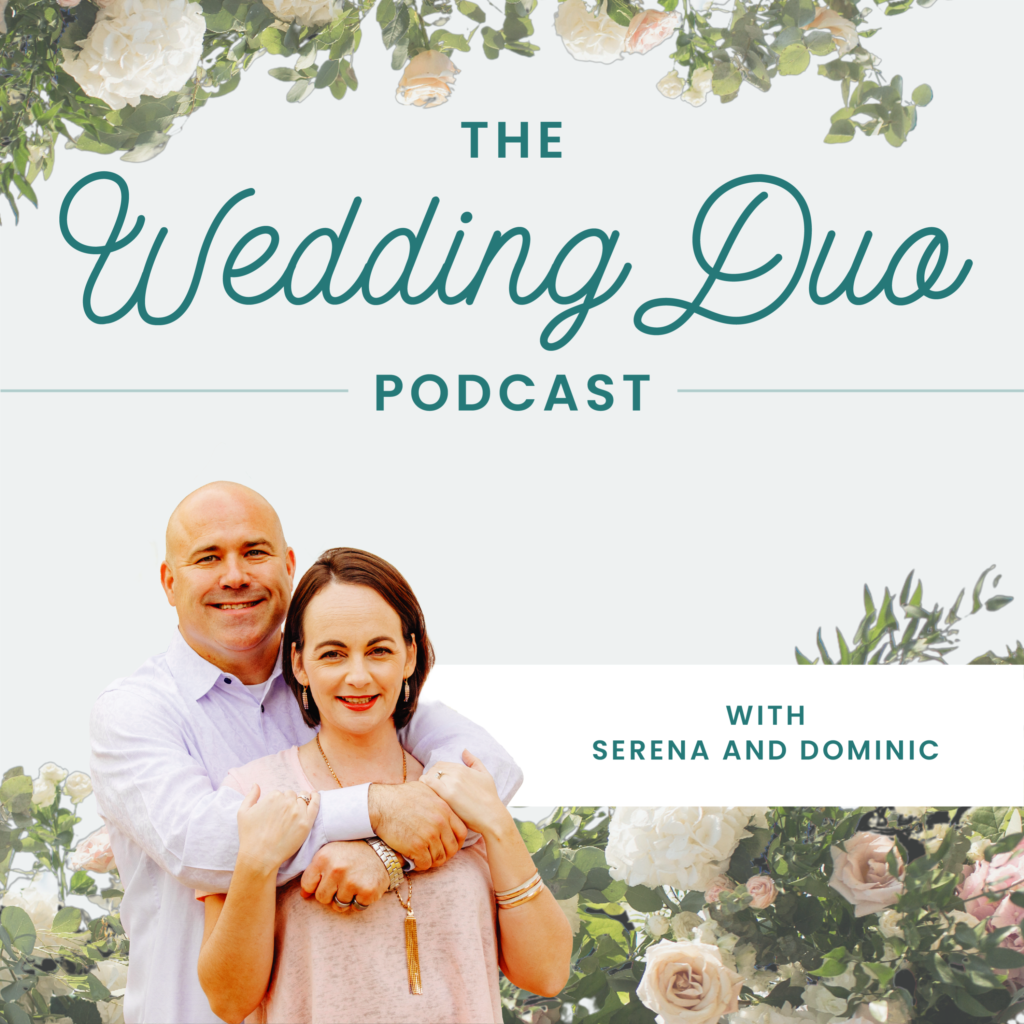
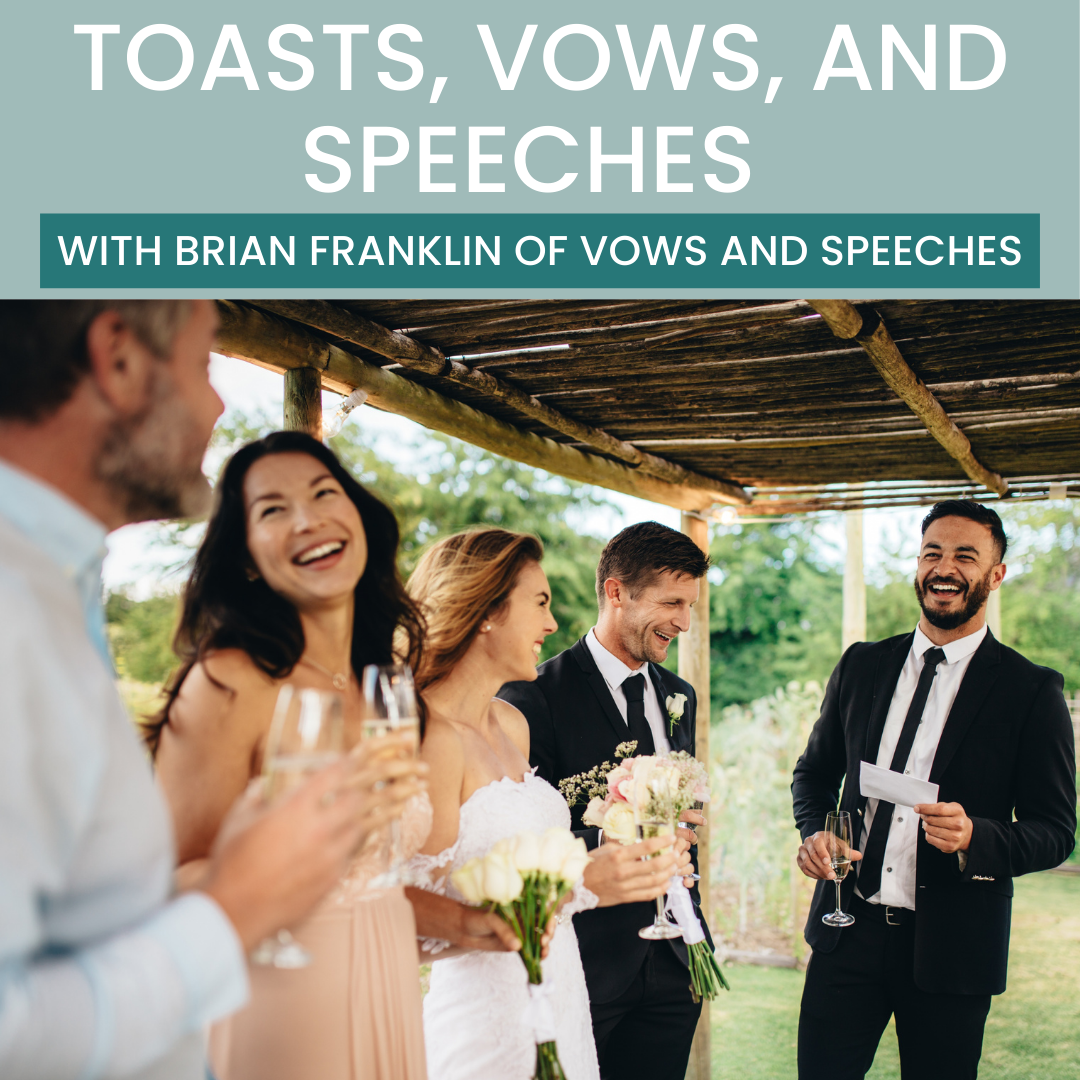
Toasts, Vows, and Speeches with Brian Franklin of Vows and Speeches
Let's Get Social
@WEDDINGDUO ON TIKTOK
Grab your free wedding day checklist here!
Download Your Free Guide!
